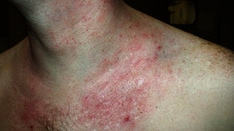When topical treatment does not control atopic dermatitis (AD) in adults, a range of advanced treatments may improve outcomes and can be considered, according to new evidence-based guidelines from the American Academy of Dermatology (AAD).
The guidelines cover approved and off-label uses of systemic therapies and phototherapy, including new treatments that have become available since the last guidelines were published almost a decade ago. These include biologics and oral Janus kinase (JAK) inhibitors, as well as older oral or injectable immunomodulators and antimetabolites, oral antibiotics, antihistamines, and phosphodiesterase-4 inhibitors. The guidelines rate the existing evidence as "strong" for dupilumab, tralokinumab, abrocitinib, baricitinib, and upadacitinib. They also conditionally recommend phototherapy, as well as cyclosporine, methotrexate, azathioprine, and mycophenolate, but recommend against the use of systemic corticosteroids.
The guidelines update the AAD's 2014 recommendations for managing AD in adults with phototherapy and systemic therapies. "At that time, prednisone — universally agreed to be the least appropriate chronic therapy for AD — was the only Food and Drug Administration–approved agent," Robert Sidbury, MD, MPH, who cochaired a 14-member multidisciplinary work group that assembled the guidelines, told this news organization. "This was the driver."
The latest guidelines were published online in the Journal of the American Academy of Dermatology.
Broad evidence review
Dr. Sidbury, chief of the division of dermatology at Seattle Children's Hospital, guidelines cochair Dawn M. R. Davis, MD, a dermatologist at the Mayo Clinic, Rochester, Minn., and colleagues conducted a systematic evidence review of phototherapy such as narrowband and broadband UVB and systemic therapies, including biologics such as dupilumab and tralokinumab, JAK inhibitors such as upadacitinib and abrocitinib, and immunosuppressants such as methotrexate and azathioprine.
Next, the work group applied the Grading of Recommendations, Assessment, Development, and Evaluation (GRADE) approach for assessing the certainty of the evidence and formulating and grading clinical recommendations based on relevant randomized trials in the medical literature.
Recommendations, future studies
Of the 11 evidence-based recommendations of therapies for adults with AD refractory to topical medications, the work group ranks 5 as "strong" based on the evidence and the rest as "conditional." "Strong" implies the benefits clearly outweigh risks and burdens, they apply to most patients in most circumstances, and they fall under good clinical practice. "Conditional" means the benefits and risks are closely balanced for most patients, "but the appropriate action may different depending on the patient or other stakeholder values," the authors wrote.
In their remarks about phototherapy, the work group noted that most published literature on the topic "reports on the efficacy and safety of narrow band UVB. Wherever possible, use a light source that minimizes the potential for harm under the supervision of a qualified clinician."
In their remarks about cyclosporine, they noted that evidence suggests an initial dose of 3 mg/kg per day to 5 mg/kg per day is effective, but that the Food and Drug Administration has not approved cyclosporine for use in AD. "The FDA has approved limited-term use (up to 1 year) in psoriasis," they wrote. "Comorbidities or drug interactions that may exacerbate toxicity make this intervention inappropriate for select patients." The work group noted that significant research gaps remain in phototherapy, especially trials that compare different phototherapy modalities and those that compare phototherapy with other AD treatment strategies.
"Larger clinical trials would also be helpful for cyclosporine, methotrexate, azathioprine, and mycophenolate to improve the certainty of evidence for those medications," they added. "Furthermore, formal cost-effectiveness analyses comparing older to newer treatments are needed."
They recommended the inclusion of active comparator arms in randomized, controlled trials as new systemic therapies continue to be developed and tested.
The work group ranked the level of evidence they reviewed for the therapies from very low to moderate. No therapy was judged to have high evidence. They also cited the short duration of most randomized controlled trials of phototherapy.
Using the guidelines in clinical care
According to Dr. Davis, the topic of which agent if any should be considered "first line" generated robust discussion among the work group members.
"When there are not robust head-to-head trials — and there are not — it is often opinion that governs this decision, and opinion should not, when possible, govern a guideline," Dr. Davis said. "Accordingly, we determined based upon the evidence agents — plural — that deserve to be considered 'first line' but not a single agent."
In her opinion, the top three considerations regarding use of systemic therapy for AD relate to patient selection and shared decision making. One, standard therapy has failed. Two, diagnosis is assured. And three, "steroid phobia should be considered," and patients should be "fully informed of risks and benefits of both treating and not treating," she said.
Dr. Sidbury reported that he serves as an advisory board member for Pfizer, a principal investigator for Regeneron, an investigator for Brickell Biotech and Galderma USA, and a consultant for Galderma Global and Micreos. Dr. Davis reported having no relevant disclosures. Other work group members reported having financial disclosures with many pharmaceutical companies. The study was supported by internal funds from the American Academy of Dermatology.
This article originally appeared on MDedge.com, part of the Medscape Professional Network.
Credit:
Lead image: Wikimedia
© 2023 Frontline Medical Communications Inc.
Cite this: AAD Updates Guidelines for Managing AD With Phototherapy and Systemic Therapies - Medscape - Nov 13, 2023.











Comments